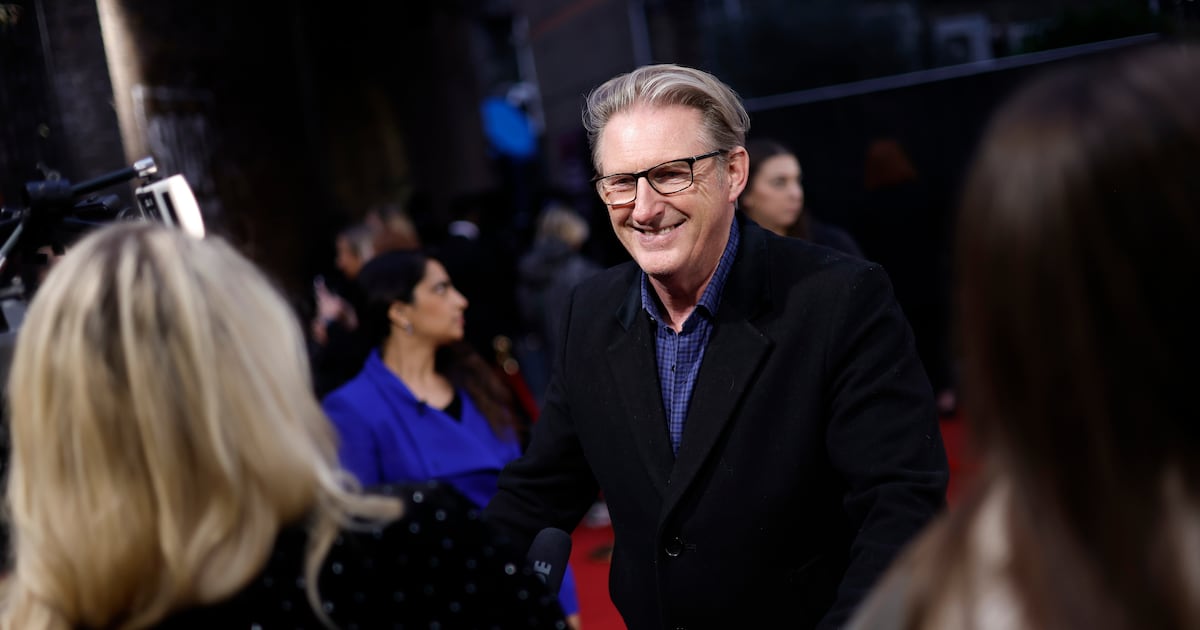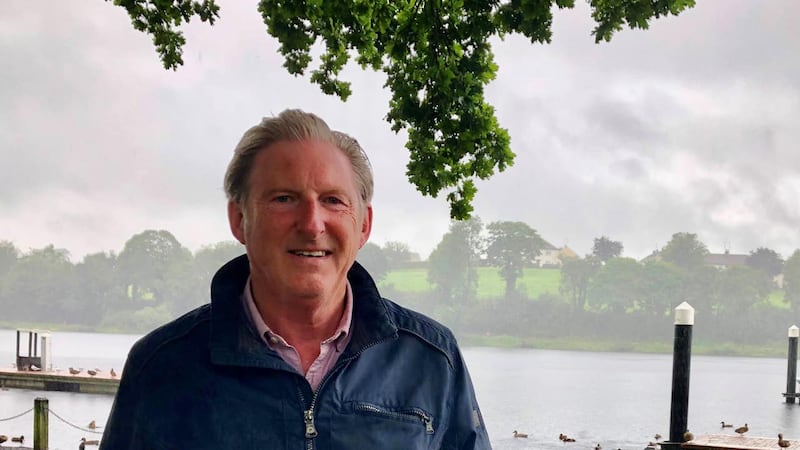Line of Duty and Ridley actor Adrian Dunbar has already seen a “new Ireland” and describes it as a “really lovely place”.
The place named New Ireland that the Enniskillen native visited, though, is a tropical paradise off the coast of Papua New Guinea in the Pacific, and while Dunbar wouldn’t claim such a glowing description for this island, he does see positive benefits for constitutional change to create a new Ireland here.
“Partition doesn’t work. I think it’s important psychologically and spiritually for the island of Ireland to be unified,” he says, but admits it will be sombre because of the number of people who have died over centuries.
He’s a great admirer of James Connolly’s brand of Socialism and believes in his vision of Ireland being a beacon for smaller nations in the world.
Dunbar also expresses the hope that Belfast can become an industrial powerhouse in a new Ireland and is open to the idea of a federal solution.
When he first went to London to take up a place at the Guildhall School of Music and Drama, Margaret Thatcher had just become British Prime Minister.
The Tories had introduced a scheme which allowed council tenants to buy their own homes. Everyone seemed to want to build an extension, and Dunbar recalls a boom time in the building trade in what he describes as “one of the great cities of the world”.
Although his career means he has lived in London since, Dunbar retains his links and affection for Ireland north and south. He still has family links in Enniskillen and a home in Co Leitrim.
Emotionally, the ties with Ireland are strong and he wants to see the country reunified.
Conscious that as an actor he’s being vocal in a wider societal debate, Dunbar insists that people in the arts have a role in clarifying issues for consideration.
“As an actor, you have to find yourself above party politics,” he says. “But it is an interesting place to see the world from because you see it from all aspects. There’s part of your job to get inside all the people who are involved in any scenario.
“But I know this for sure, partition is bad. It’s bad for any country.”
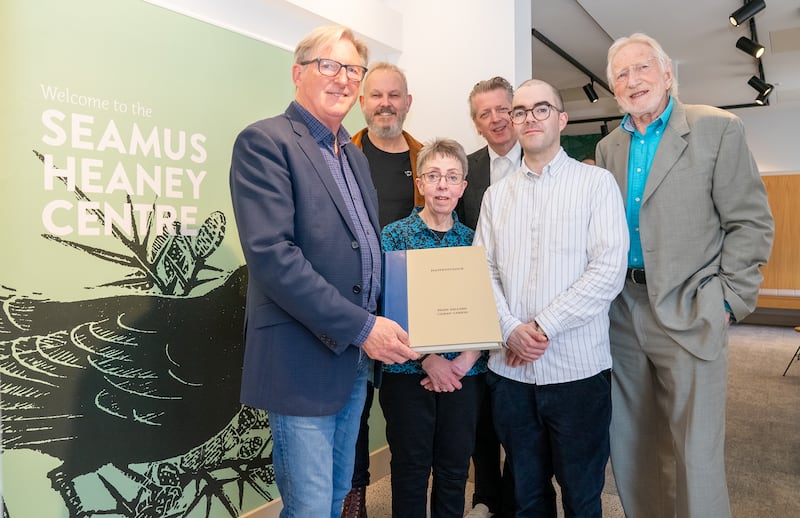 Adrian Dunbar, Michael O’Neill from Armchair & Rocket, Deirdre Carson, Professor Glenn Patterson, director of the Seamus Heaney Centre at Queen’s, Gerard Carson and Brian Ballard
Adrian Dunbar, Michael O’Neill from Armchair & Rocket, Deirdre Carson, Professor Glenn Patterson, director of the Seamus Heaney Centre at Queen’s, Gerard Carson and Brian Ballard
He believes that when we’re considering change, language is important and says writers can often find the right language, citing Brian Friel as a great example.
“At the moment, we’ve lost control of language. The language of diplomacy seems to have gone out the window, and people are saying things that are really kind of abrasive and inflammatory,” says Dunbar. “There are presidents and world leaders who should know better.
“Where Northern Ireland and Ireland is concerned, I think we need to find the proper language to talk to each other that leads us towards a democratic settlement. I would hope in some shape or form we can find the language to move forward.
“It’s important for people to also realise that the unification of Ireland will be a very sombre affair because of the number of people who have died over hundreds of years trying to achieve that. I include all those people who fought in the rebellion of 1798, especially in the north of Ireland.”
Born and reared in Co Fermanagh, where he retains strong family and community links, Dunbar agrees that the north is different to the rest of the island; indeed, like the north of England, where he professes a love of Manchester when he works there.
“It’s always been different in its attitudes and all so I do think we would need to get together with the brethren in Monaghan, Cavan and Donegal and act as one in our own interests,” he says.
“When Ulster gets our three counties back you’ll be able to go from Virginia away down in Co Cavan all the way up to Inishowen in one big region,” he says, and adds that in a federal system Ulster could act as one in its own interests.
“That could happen naturally within a parliament in Dublin. We would be voting for the A5 and making sure we had good local services such as hospitals,” he says, alluding to the battle for health provision in his hometown of Enniskillen. “There would be bread and butter issues, which areas would have some control over.”
“It wouldn’t worry me if we try to set federal executives in major centres,” says Dunbar, who has an affinity for Belfast where the iconic Line Of Duty television series is filmed.
Dunbar regularly visits and says, “Belfast is a great city.”
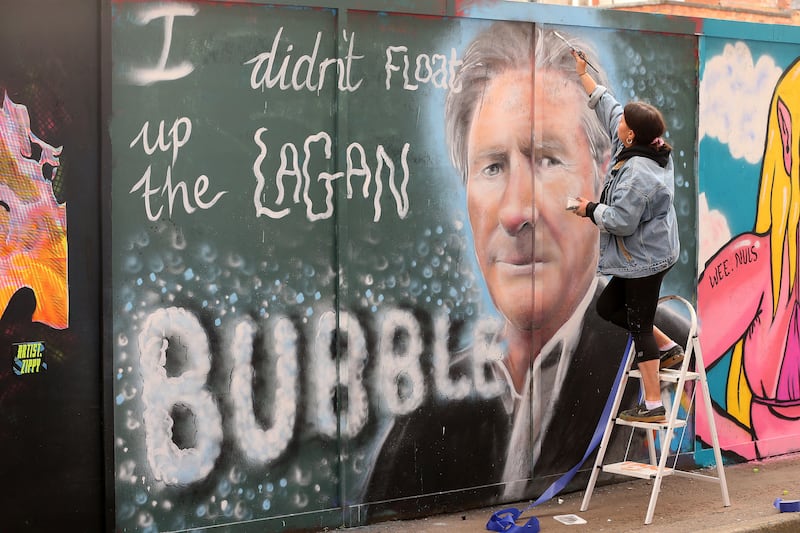 The mural, which depicts Superintendent Hastings – played by Fermanagh man Adrian Dunbar – and his now iconic quote ‘I didn’t come up the Lagan in a bubble’, Union Street, Belfast
The mural, which depicts Superintendent Hastings – played by Fermanagh man Adrian Dunbar – and his now iconic quote ‘I didn’t come up the Lagan in a bubble’, Union Street, Belfast
He has memories of one of his early roles at the Lyric Theatre in Graham Reid’s powerful play The Hidden Curriculum about the stresses a Belfast school faces from paramilitarism outside.
He once recounted that a gun battle was going on in the streets outside the Lyric and the audience thought it was part of the play.
The Belfast actor James Ellis also became a mentor to the young Dunbar, who describes him as his hero in the profession.
Ellis achieved fame as Sergeant Bert Lynch in the 1960s BBC police drama Z Cars. Dunbar feels that, in a sense, he followed in Ellis’s footsteps with his role in the modern-day police drama Line Of Duty in which he plays Ted Hastings who leads an anti-corruption unit.
But it is as a centre for business that Dunbar speaks about Belfast in discussing change across the island, and he believes that it can draw people from across Ulster as well as nearby Co Leitrim where Dunbar has a second home when he wants to get a bolthole from London.
“Belfast is a great city for business, it always has been,” he says, pointing out that before the 1920s and partition, Belfast led the way in industrial output across Ireland.
“It’s ready to do that again and the more links with Dublin and across the island the better.”
He describes Belfast as the most republican city in Ireland, that is with a small ‘r’, with leading businesses historically refusing to deal in sugar because of its links with the slave trade.
“Belfast had principles during the time of the United Irishmen, and I’d like to see the city getting back to the powerhouse it once was,” says Dunbar.
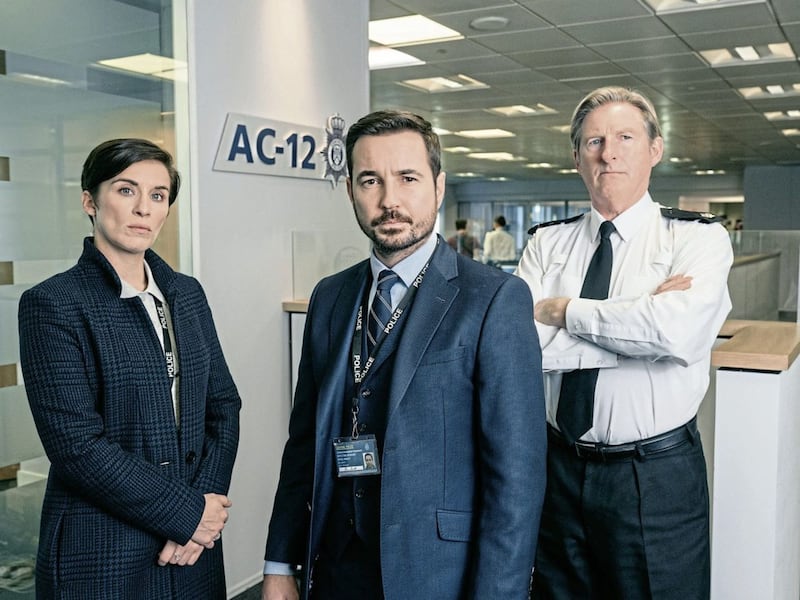 Line of Duty stars Vicky McClure, Martin Compston and Adrian Dunbar. Picture by World Productions/BBC One/PA Wire
Line of Duty stars Vicky McClure, Martin Compston and Adrian Dunbar. Picture by World Productions/BBC One/PA Wire
Aside from the debate over systems and the logistics of government, be it federalism or something else, Dunbar is convinced of the need for unity.
“Partition is bad for any country. We see it in Palestine, we see it the world over, and we’ve seen it in Northern Ireland. If you divide people against each other, you get a very insecure and fearful society,” he says and is critical of unionist “intransigence” in dealing with inequality.
He also warns that in resolving partition, there is a need to avoid the mistakes Westminster made in leaving countries like Cyprus.
He feels a lot of the problems in Northern Ireland were the result of inequality in housing and raises the issues of social problems in Ireland caused by housing issues.
“If everybody else has somewhere to live, they don’t get exercised by the idea that immigrants should have somewhere to live. All the people need somewhere to live, and if the State could provide that then they don’t get exercised that we might have to put a few hotel rooms to host people who are escaping war and strife across the world,” says Dunbar.
Despite some of the social problems, Dunbar feels that Ireland has made progress as a modern democracy.
“Whereas Israel has allowed itself and its democracy to be destroyed by orthodoxy, Ireland has been amazing at controlling its democracy. It is a stable country, albeit it has the same problems as many European countries,” he says.
“It’s fulfilling the destiny set out by James Connolly at the GPO in 1916. He wanted Ireland to be a beacon for small nations.
“He realised after visiting the United States that the USA could not be pulled together into a Socialist Republic. It was too big with too many states and too many people.
“But Connolly realised that Ireland, being smaller, could have a place in the world. I think that Ireland is sort of becoming that place. I believe Connolly would be proud of where Ireland is positioning itself at the minute,” says Dunbar.
But, he adds, “We have to re-imagine things to achieve unification. I’m not into expanding government; it’s big enough. But you can offer Belfast autonomy without handing it to Cork, or Galway or others to govern their own regions.”
